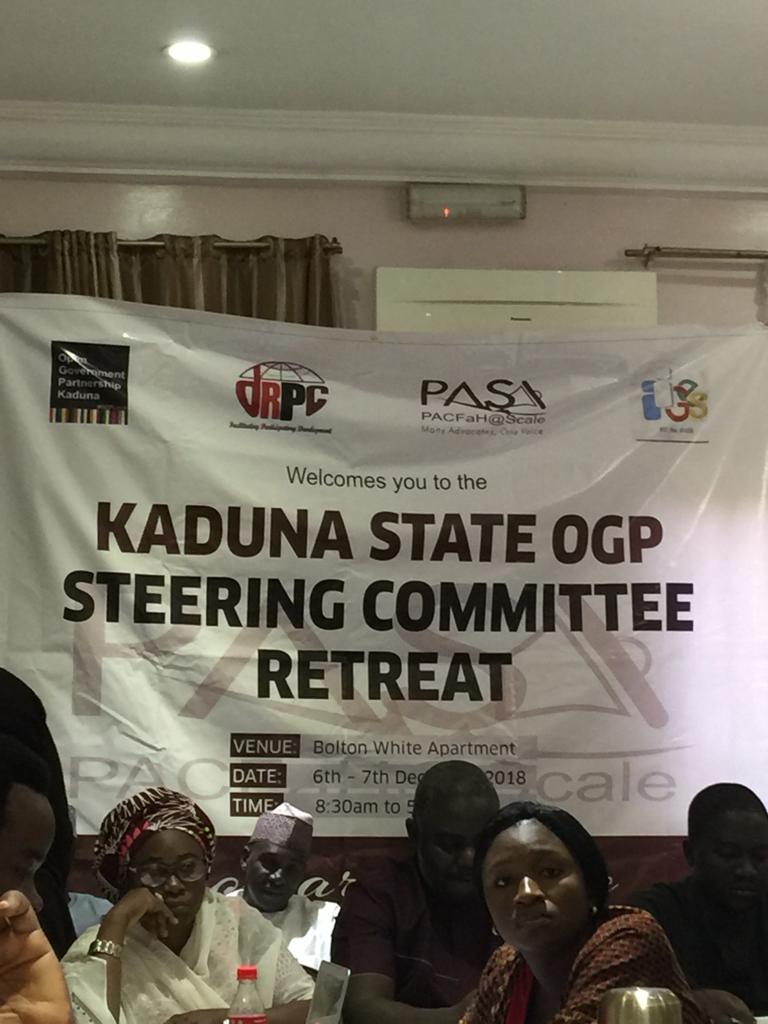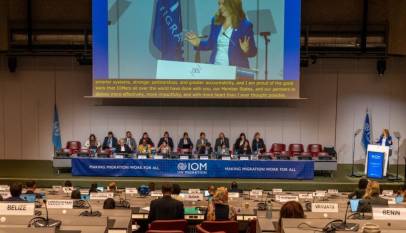INDEPTH: OGP and the pursuit for improved service delivery in Kaduna’s health sector
Members of the Kaduna State Open Government Partnership (OGP) community including the State Steering Committee (SSC) and respective Technical Working Groups (TWGs) recently gathered in Abuja for a two-day retreat aimed at strengthening their capacity for effective monitoring and evaluation

The retreat was supported by the development Research and Projects Center (dRPC) under the Partnership for Advocacy in Child and Family Health at Scale (PACFaH@Scale) project and had in attendance various OGP stakeholders from Kaduna state including government actors, civil society organizations, the organized private sector and professional bodies, in accordance with the principle of co-creation.
PACFaH@Scale or simply PAS is a five-year health and social accountability project funded by the Bill and Melinda Gates Foundation (BMGF) which advocates to the executives and legislatures at federal, states and LGA levels the need to fulfill their service and social compacts with the citizens, fulfill promises made and implement policies, laws and regulations that have positive health impacts on the people.
It would be recalled that in May, 2016, President Muhammadu Buhari made a commitment at the London anti-corruption summit to have Nigeria join the global Open Government Partnership (OGP) community; in June 2016, Nigeria joined the global OGP community. The global OGP is overseen by an international steering committee of nine government and nine leading civil society representatives.
In 2017, Kaduna state became the first subnational entity in Nigeria to sign up to the OGP, which was immediately followed by the development of a State [OGP] Action Plan (SAP). The Kaduna State Action Plan (KAP) is focused on three thematic areas which are: promoting fiscal transparency; access to information as well as citizen engagement and empowerment.
In addition to the three thematic areas, KAP has five key commitment areas as well as a special commitment area for Monitoring and Evaluation (M&E). They are ensuring more citizens participation across the entire budget cycle; full implementation of Open Contracting Data Standard (OCDS) in the public sector; and improving the ease of doing business in Kaduna state. Others are developing and adopting guidelines for the actualization of the public right to access information held by government and establishing effective implementation; and finally, developing a permanent dialogue mechanism through technology-based citizen feedback on all the projects and programs.
The governance structure for the Kaduna OGP community is comprised of the State Steering Committee (SSC) and Technical Working Groups (TWGs) – whose mandate is to ratify the decisions of the SSC. The TWGs, SSC and OGP secretariat form the Kaduna OGP community. The SSC is comprised of 12 members (6 state actors and 6 non-state actors) whose mandates cut across the 5 state OGP commitment areas as well as the sixth special commitment area for Monitoring and Evaluation (M&E).
In total, there are 6 Technical Working Groups (TWGs) – one for each of the 5 commitment areas including the sixth M&E TWG commitment area. The idea for the M&E TWG is to serve as a self-assessment tool that helps the Kaduna OGP community monitor and evaluate its progress in implementing the SAP as well as ensure the community stays on track, including in the event of change in government policies.
As stated in the SAP, the role of each of the TWGs is developing action plan, setting strategy and procedures; providing outreach and support services; sourcing for potential partners; as well as making recommendations for the SSC; and reviewing the performance of the annual action plan for their respective commitment areas.
On the other hand, the SSC’s role, as also stated in the SAP, is to set high-level strategy, policies, and procedures; provide targeted outreach and support to encourage members, government institutions and non-state actors to meet their OGP commitments; as well as set a strong example by upholding OGP values and principles. Other roles include connecting the OGP secretariat to key potential partners; recommending the approval of OGP action plan to the State OGP community; and reviewing the performance of the action plan.
While welcoming members of the Kaduna OGP community to the retreat, Muhammad Sani Abdullahi, commissioner for budget and planning in Kaduna state cum co-chair of the OGP State Steering Committee, said if the principles and commitments of the OGP were fully implemented, “the lives of our people will be improved”.
“We have to make sure that implementation of these commitments affects the lives of ordinary citizens, positively. I believe what we are doing here today is critical for achieving what we have committed to do, internationally. What we need to agree on and understand is that we didn’t join the OGP because it is nice to be part of a global community; we have to understand the fact that, if we implement these principles, there will be changes in terms of service delivery to the people,” said Abdullahi.
Zakari Zakariya, an M&E expert who delivered an evaluation of the Kaduna state OGP action plan said the roles of the civil society and that of the citizens were very important in ensuring the OGP principles worked in Kaduna’s health sector adding that there was need to ensure transparency and accountability in the sector as the basis for the OGP principles to work.
“This means that service delivery in the health sector will not be effective and efficient without some level of accountability and transparency, therefore, the citizens should be able to get involved in the sector. There is need for budget transparency; budget is housed in the budget and planning ministry, therefore, they must ensure citizens participation in budget processes to achieve open budget. The ministry of budget and planning should be able to coordinate this open relationship with the citizens,” said Zakariya.
While presenting a step-by-step guide to the implementation of the Kaduna State Action Plan (KAP), Stanley Achonu, the civil society adviser at the national secretariat of the Open Government Partnership (OGP) said: “The focus of OGP is the ordinary people of Kaduna state, how do we support their lives? And most importantly, the lives of all of us would be improved if the OGP action plan is well implemented.”
Achonu, who said the world will evaluate Kaduna state on the basis of its action plan emphasized the importance of feedback as a major tool for monitoring implementation of the SAP and thus urged members of the Kaduna OGP community to work together to monitor and document findings arising from the implementation of the action plan. “Monitor and document every stage of the implementation of the commitments. Ongoing monitoring of implementation should serve as advocacy opportunity when stakeholders identify any challenge with the implementation of the commitments,” he told the participants.
While chairing a panel discussion on the role of the OGP process in ensuring accountability in Kaduna’s health sector towards improved service delivery, Dr. Mustapha Jumare, co-chair of the Kaduna State Maternal Accountability Mechanism (KADMAM) cum co-chair of the state OGP steering committee said the major challenges facing the health sector in Kaduna were to do with dilapidated infrastructure, shortage of drugs and that of manpower.
“As a result of the challenges in the health system, we are working on an accountability mechanism and have been doing some spot-checks around the facilities and what we found out were issues to do with dilapidated infrastructure, shortage of drugs and then manpower; this has affected attendance at the facilities which has reduced significantly. There is a serious shortage of staff such that some facilities are not even functioning because of lack of staff,” said Jumare.
He said, as part of their effort towards addressing the challenges in the health sector they had successfully advocated to the Kaduna State Drugs and Medical Supplies Management Agency to directly engage drugs manufacturers so they will be supplying the state with drugs directly as against procuring the drugs through contractors, which he said affects the quality of the drugs being supplied. “We paid an advocacy visit to the drugs management agency, they are now reviewing the law establishing the agency and of course there is now an intensified effort towards implementing our suggestion.”
Jumare added that they also successfully advocated for the implementation of the Primary Health Care under One Roof (PHCUOR), a policy aimed at reducing fragmentation in the delivery of Primary Health Care (PHC) services by integrating all PHC workers and services under one public authority.
“All the health workers, either under the local government service commission or ministry of health, are being pulled together under the state primary healthcare development agency. Initially, they were scattered in so many places but they are now being pulled into one place and this has enabled the state PHC development agency to make assessment of their staff strength: how many they have, how many they need and for what specific fields. They found out they required over 3000 more health workers, which has been approved by the government,” he said.
Also speaking during the panel discussion, Hadiza Umar, a member of the Kaduna OGP community and executive director of the Hope for Communities and Children Initiative (H4CC) said the OGP was neither a program nor a project, instead, “it is a catalyst for open governance across sectors through the 5 commitment areas including citizen engagement”, which she described as “the pathway for reaching the beneficiaries of service delivery.”
“Through the network of civil societies working in the health sector, citizens’ participation has increased. As a result, health issues including access to FP and child killer diseases are being addressed by the government. There were advocacies for the government to be responsive to the health needs of the people by improving and making accessible healthcare facilities, ensuring availability of personnel and drugs. All these are what form the commitments of the OGP action plan for citizens’ engagement,” she said.
When asked about how maternal and childcare in Kaduna state was benefiting from the implementation of the OGP action plan, Umar said: “People are benefitting from the OGP because the OGP community partnered the government to develop need-based budgets, monitor quality of services being provided as well as sensitize and encourage citizens to participate in decision making by creating a platform for citizens to articulate their demands and advocate to government through town hall meetings, public policy dialogue and media channels of communication.”
Another panelist, Phoebe Sukai Yayi, a director at the Kaduna State Budget and Planning Commission said the OGP process had turned the Kaduna State Government into an “open book” and also helped improved budgetary allocation and releases for the health sector adding that the government would always welcome “any initiative that improves the wellbeing of the people of Kaduna state, physically, economically, politically and socially.”
“Talking about improving health budget, it is at the center of the government’s priority; attention is being given to under-five children and pregnant women regarding issues such as family planning and routine immunization towards improved service delivery. And it’s a continuous process; the government will always come up with new ideas and innovations to be able to achieve the desired result in relation to improving healthcare service delivery for the people of Kaduna,” she said.
In a goodwill message, Ashiru Sani of UK-DFID’s governance reform programme, Partnership to Engage, Reform and Learn (PERL) said: “PERL is committed to OGP, PERL is investing hugely in OGP commitment areas because it is in line with our own commitments; we encourage accountability, transparency, and openness in government. The OGP has increased the tempo with which accountability is been pursued, let’s look at this as a continuous struggle to make government and citizens engage more towards improving service delivery.”
Ensuring transparency and accountability in the management of health budgets will lead to improved access and service delivery for healthcare services, in accordance with the principles of the Open Government Partnership. This will definitely help Kaduna state address critically-important health challenges such as maternal mortality and major child killer diseases leading to positive health impacts on the citizens of the state.













